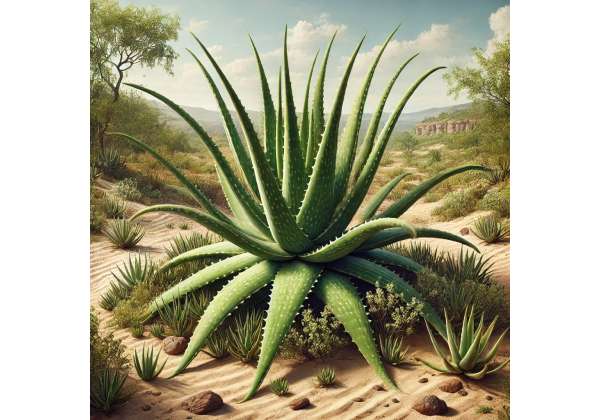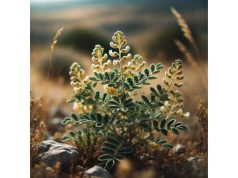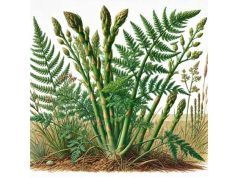
Aloe vera—scientifically identified as Aloe barbadensis miller—is a succulent plant widely admired for its thick, juicy leaves and soothing gel. Believed to have originated in the Arabian Peninsula, this robust species now thrives globally in warm climates and as a treasured houseplant. Revered across millennia, aloe’s clear inner gel has become synonymous with rapid skin relief, first-aid treatments, and even decorative horticulture. Many people keep an aloe plant readily available, snipping a leaf to address sunburn, minor cuts, or dry patches, a testament to the herb’s enduring popularity in everyday wellness.
The succulent’s remarkable capacity to store water renders it drought-tolerant, while its spiky leaves can soar up to 60 centimeters in mature specimens. Historically, various cultures lauded aloe as the “plant of immortality”—particularly in Egypt—valuing its gel for beautifying the skin and its latex for potential digestive benefits. In modern times, the cosmetics industry harnesses aloe extracts for lotions, shampoos, and an array of personal care products. Meanwhile, emerging research into aloe’s polysaccharides, antioxidants, and bioactive compounds highlights a possible spectrum of advantages, from digestive support to immunomodulation. However, as with most herbal remedies, prudent use is key; certain constituents (such as aloin in the leaf’s latex) can produce strong laxative effects, or potentially irritate when used in large amounts.
- Fast, soothing relief for minor burns and skin irritations
- Potential to support digestion in controlled amounts
- Broad use in cosmetics for moisturizing and anti-aging formulas
- Rich in polysaccharides, antioxidants, and other bioactive compounds
- Easy cultivation for home medicinal and ornamental purposes
Table of Contents
- Aloe Vera: Botanical Overview and Key Characteristics
- Aloe Vera: Historical Roots and Cultural Traditions
- Aloe Vera: Active Compounds and Phytochemicals
- Aloe Vera: Notable Health Benefits and Supportive Properties
- Aloe Vera: Common Uses, Practical Applications, and Safety
- Aloe Vera: Significant Research and Contemporary Findings
- Aloe Vera: Frequently Asked Questions
Aloe Vera: Botanical Overview and Key Characteristics
Aloe vera belongs to the Asphodelaceae family, which also includes other succulent-like genera (e.g., Haworthia). Its thick, fleshy leaves capture water and nutrients, enabling survival in arid or semi-desert conditions. Botanically, it’s a perennial succulent known for:
Classification and Native Habitat
- Taxonomy and Relatives
- Formerly categorized under the Liliaceae family, reclassifications placed aloe within Asphodelaceae, subfamily Asphodeloideae.
- Related to over 500 aloe species, though Aloe vera is singled out for commercial and medicinal prominence.
- Native Range
- Believed to originate along the Arabian Peninsula, though its exact wild lineage remains debated due to millennia of cultivation.
- Today, grown across Africa, Asia, the Americas, and the Mediterranean region—anywhere frost is minimal and drainage is good.
Physical Description
- Leaf Architecture
- Leaves grow in a rosette pattern from the central base, typically 10–20 thick, lanceolate leaves per mature plant.
- Leaf length can span 30–60 cm, featuring serrated edges with small whitish teeth, and a variegated or spotted pattern in juveniles.
- Gel and Latex
- The leaf interior houses a clear, mucilaginous gel prized for topical usage.
- Underneath the leaf’s green rind, a yellowish latex or “sap” resides, containing aloin and anthraquinones, known for strong laxative effects.
- Flowers and Seeds
- Under ideal conditions, mature aloes produce a tall inflorescence (up to 90 cm) with tubular, yellowish or orange blossoms.
- Typically grown indoors for leaves, few home gardeners see consistent flowering. Seed propagation is possible but overshadowed by easier offsets.
Growth Needs and Cultivation
- Soil Preferences
- Well-draining sandy or cactus mix soil is ideal. Overwatering or poorly drained substrates invite root rot.
- A slightly acidic to neutral pH typically suits the plant.
- Light and Climate
- Prefers bright, direct sunlight or partial shade. Minimal frost tolerance demands indoor overwintering in cold climates.
- Tolerates dryness better than constant moisture.
- Propagation
- Most commonly via offsets or pups that emerge at the plant’s base.
- Gently separate pups once they develop a few leaves and their own root nubs.
Variants and Confusions
- Other Aloe Species
- Varieties such as Aloe arborescens, Aloe ferox are sometimes confused with Aloe vera, but differ in growth pattern or resin composition.
- Marketing Label Misuse
- Some products labeled “aloe” might contain minimal actual aloe or use different species. Look for “Aloe barbadensis miller” in ingredients for authenticity.
Ecological and Environmental Role
- Landscaping
- In warmer regions, aloe acts as a water-wise ornamental, aiding in xeriscape designs.
- Pollinator Support
- Flowers can attract hummingbirds, bees, or sunbirds, though limited in typical potted houseplants.
Overall, Aloe vera stands out for its robust succulent form, easily recognized by tapered leaves bursting with cool gel—a distinctive natural remedy that has traveled from arid habitats to global households.
Aloe Vera: Historical Roots and Cultural Traditions
From ancient tomb inscriptions to modern cosmetic shelves, aloe’s global trajectory highlights how diverse cultures embraced its versatile nature.
Prehistoric Origins and Early Civilizations
- Egyptian Records:
- Egyptians revered aloe’s “plant of immortality” status, featuring it in burial rituals and daily beauty regimens. Cleopatra famously utilized aloe’s sap for skin care.
- Papyrus Ebers (circa 1550 BCE) mentions aloe’s wound-healing traits and possible internal use, reflecting an advanced herbal knowledge.
- Mesopotamia and Persia:
- Traders carried aloe across the Fertile Crescent, labeling it a soothing gel for burns or irritations, an attribute prized in hot desert climates.
Greek, Roman, and Ayurvedic Embrace
- Classical Greek and Roman Texts:
- Hippocrates, Dioscorides, and Pliny the Elder chronicled aloe’s purgative (laxative) capacity, external application for skin lesions, and possible immune benefits.
- Roman legionnaires apparently traveled with aloe-based salves, ensuring quick burn or cut relief.
- Ayurveda in India:
- Referred to as “Kumari,” aloe plays a part in maintaining female reproductive health, digestive support, and skin cleansing.
- Ayurveda merges aloe with other herbs for balancing doshas, harnessing the plant’s cooling and moisturizing properties.
Middle Ages and Global Spread
- Arab Traders and Crusades:
- Demand for aloe soared, as Arabian traders recognized its commercial potential, distributing dried latex or whole leaves from East Africa to Europe.
- Middle Age apothecaries expanded aloe’s usage in tonics and topical salves.
Colonial Era and New World Adaptation
- Spanish Explorers in the Americas:
- Brought aloe to the Caribbean and Latin America, quickly adopting it in local medicine.
- Some indigenous tribes integrated aloe in their own healing practices once introduced, though they had established traditions with cacti and other native succulents.
- North American Recognition:
- Settlers recognized aloe’s soothing for sunburn, insect stings, and mild scrapes. 19th-century American pharmacies sold “aloes,” a dried latex derivative primarily for digestive or hepatic concerns.
Modern Commercial Rise
- Mid-20th Century Cosmetic Boom:
- As consumer focus on “natural beauty” rose, aloe-based lotions, gels, and shampoos soared in popularity. The mild, non-greasy texture appealed to sunbathers and everyday skincare users.
- Global Aloe Industry:
- Large-scale plantations emerged in places like Mexico, the Dominican Republic, China, and India, fueling a multi-billion-dollar market in personal care, nutraceutical, and beverage sectors.
Cultural Symbolism and Folklore
- Household Guardian:
Many cultures consider aloe an auspicious plant. In parts of Asia and Africa, potted aloe near doorways is believed to bring good health or ward off evil. - Religious and Ritualistic Uses:
Some ceremonies incorporate aloe leaves or gel for purification or blessings, continuing older traditions from Egyptian or Greek rites.
In sum, aloe’s journey arcs from revered ancient remedy to a ubiquitous fixture in global beauty and wellness. Reinterpreted across eras and continents, the succulent stands as a living testament to humankind’s enduring faith in nature’s ability to heal, beautify, and sustain.
Aloe Vera: Active Compounds and Phytochemicals
Aloe vera’s reputation as a skin soother and health booster stems from an intricate chemical makeup, with each leaf housing a complex suite of polysaccharides, enzymes, and anthraquinones. Though water constitutes much of the inner gel, the remaining constituents pack a subtle but potentially potent effect.
Polysaccharides
- Acemannan:
- A major polysaccharide credited with immune-modulating, hydrating, and tissue-healing capacities.
- Potentially supports fibroblast activity in wound repair, explaining aloe’s scarring benefits.
- Glucomannans:
- Similar to acemannan, help maintain structural viscosity in the gel, promoting moisture retention.
- Indicated in some research to support cell regeneration and local immunity.
Enzymes and Amino Acids
- Enzymes:
- Includes amylase, lipase, cellulase, and others, though their activity after harvest may degrade if not stabilized.
- Some minor benefit in facilitating nutrient breakdown or mild anti-inflammatory effects.
- Amino Acids:
- Aloe vera gel provides small amounts of essential and non-essential amino acids.
- Though not a major protein source, synergy might foster healing or metabolic processes.
Anthraquinones
- Aloin (Barbaloin) and Emodin:
- Concentrated in the leaf’s latex layer near the rind, delivering potent laxative effects.
- Overconsumption can irritate the colon and cause cramping or diarrhea.
- Also credited with antibacterial or antiviral potential in small, carefully measured doses.
- Rhein and Others:
- Additional anthraquinones exhibit antimicrobial or anti-inflammatory actions in vitro. Warrant caution for internal usage, though recognized for strong purgative capacity.
Vitamins, Minerals, and Antioxidants
- Vitamin C and E:
- Gel typically holds minor but consistent levels, supporting free radical scavenging and skin health.
- Beta-carotene:
- Adds slight color and antioxidant effect, though overshadowed by more concentrated sources like carrots.
- Minerals:
- Calcium, magnesium, zinc, and others in trace amounts. Typically not a primary source but contribute to broad nutritional synergy.
Saponins and Lignins
- Saponins:
- Offer gentle cleansing or foaming properties, possibly contributing mild antiseptic qualities.
- Lignin:
- A structural compound believed to help aloe gel penetrate deeper skin layers, increasing topical efficacy for dryness or minor irritations.
pH and Stability
- Gel’s pH:
- Often slightly acidic (around 4.5–5.0), aligning with typical skincare-friendly pH.
- Oxidation Risks:
- Fresh gel can degrade quickly once exposed to air; commercial stabilizers or cold processing methods preserve bioactivity.
Synergistic Action
- Entourage Effect:
- Researchers suggest aloe’s wide array of substances collectively shape its healing reputation. Isolating single components (e.g., aloin) rarely replicates the synergy of fresh or stabilized whole-leaf gel.
Hence, from acemannan’s immune relevance to anthraquinones’ potent laxative and antimicrobial traits, aloe’s internal chemistry represents a delicate balance. Harnessing these benefits responsibly demands an understanding of each compound’s function, dosage, and possible side effects—particularly for ingestion.
Aloe Vera: Notable Health Benefits and Supportive Properties
Aloe vera’s standing in global herbal traditions stems from tangible benefits, primarily for skin health and potential digestive support. Modern science corroborates some of these uses, though caution about dosage and product quality remains crucial.
1. Skin Soothing and Healing
- Burn Relief and Minor Wounds:
- Aloe gel’s cooling moisture can reduce redness, itching, and discomfort from sunburn, minor scalds, or rashes.
- Polysaccharides like acemannan aid skin cell regeneration, forming a gentle barrier that speeds superficial healing.
- Moisturizing and Anti-Aging:
- Frequent in creams, lotions, or after-sun formulations for locking in moisture without heavy residue.
- Antioxidants help neutralize free radicals, possibly diminishing signs of photoaging over consistent use.
2. Digestive and Gastrointestinal Comfort
- Laxative Effects:
- Aloe latex (found under the leaf rind) is potent, containing anthraquinones such as aloin. Historically utilized for constipation relief, though modern guidelines warn about long-term or excessive usage.
- Gut Health Support:
- Some claim aloe gel can soothe mild GI inflammation or help with IBS symptoms, referencing the gel’s mucilaginous texture. Preliminary evidence is mixed, requiring more robust clinical data.
3. Anti-Inflammatory and Antioxidant Roles
- Inflammation Moderation:
- Laboratory tests illustrate how aloe compounds can reduce inflammatory markers, beneficial for mild arthritic pains or localized swelling.
- Oxidative Stress Defense:
- Vitamins C, E, and polyphenols in aloe may help scavenge free radicals, though the amounts in typical skincare or dietary supplements vary widely.
4. Oral Health and Dental Applications
- Mouthwash or Toothpaste:
- Some natural oral care products incorporate aloe for soothing gum inflammation or mild antibacterial action.
- A 2017 trial in the Journal of Clinical and Diagnostic Research suggested aloe mouthwash can reduce plaque accumulation comparably to standard mouthwash with fewer side effects.
5. Glycemic and Metabolic Claims
- Potential Blood Sugar Modulation:
- A handful of small clinical studies indicate some improvement in glucose control among type 2 diabetes patients using aloe gel supplements. Results remain inconsistent, calling for more extensive trials.
- Lipid Regulation:
- Some anecdotal or preliminary findings link aloe ingestion with mild reductions in LDL cholesterol or improvements in lipid profiles, though high-level evidence is lacking.
6. Immune and Wound Recovery
- Immune Stimulation:
- Polysaccharides like acemannan might encourage macrophage activity or cytokine production in certain lab setups.
- Surgical Incision Healing:
- Mild anecdotal support for quicker scar formation. Many surgeons remain cautious about recommending topical aloe, urging sterile conditions and well-formulated products to avoid infection.
Balanced Perspective on Efficacy
- Variation in Quality:
- Commercial aloe products differ widely in concentration, presence of latex fractions, and added preservatives. Purity significantly impacts efficacy.
- Evidence Gap for Some Uses:
- While proven beneficial for minor burns or sunburn relief, other claims (like potent anticancer or major weight loss roles) remain unverified or weak.
- Complementary Approach:
- In integrative medicine, aloe often pairs with other supportive herbs or conventional treatments, amplifying modest benefits rather than serving as a standalone remedy for severe conditions.
Thus, from sunburn solutions to potential GI relief, aloe’s multi-faceted traits underscore its broad global popularity. Ongoing research continues refining dosage parameters and identifying synergy with other therapies, ensuring a stable position for aloe among top herbal mainstays.
Aloe Vera: Common Uses, Practical Applications, and Safety
Household and Culinary Uses
- Fresh Gel for Topical Relief:
- Snip a lower leaf, peel away the outer rind, and apply the translucent gel onto minor burns, insect bites, or dryness.
- Rinse or pat gently if the gel becomes sticky. Avoid contact with open or deep wounds without professional advice.
- Smoothies and Drinks (Interior Fillet Only):
- Some people blend the inner filet (gel) into juices or smoothies for a refreshing, hydrating beverage.
- Must carefully remove the yellow latex, which can be bitter and laxative. Overconsumption may cause cramps or diarrhea.
- Cosmetic and Skincare:
- The gel’s humectant properties make it a staple in lotions, face masks, or homemade hair conditioners.
- Incorporate a spoonful of fresh gel into DIY face packs with cucumber or oatmeal for a soothing effect.
Medicinal and Supplement Forms
- Commercial Gels and Creams:
- Over-the-counter aloe products help with after-sun care, mild dryness, or irritation. Check ingredient lists for real aloe content vs. marketing hype.
- Aloe Juices and Capsules:
- Purported for digestive cleansing or acid reflux support. Quality and standardization vary. Look for products labeled “decolorized” or “aloin-free” to minimize the laxative factor.
- Latex-Derived Laxatives:
- Historically used, but now discouraged or restricted in many countries. Potential side effects can be severe if misused. FDA advises caution due to possible toxicity.
Safety Considerations
- Potential Allergies or Skin Sensitivities:
- Some individuals develop contact dermatitis or itching from aloe. Patch-test new products, especially if you have sensitive skin.
- Latex-Related Toxicity:
- The anthraquinones in aloe latex can cause abdominal pain, diarrhea, or electrolyte imbalances if ingested in large amounts. Chronic misuse may harm the colon.
- Pregnancy and Breastfeeding:
- Internal use is typically not recommended. External usage in small amounts is usually considered safe, but consult a professional.
- Interactions with Medications:
- Strong laxative effects can hamper drug absorption, especially for those with diuretic or heart medication regimens. Seek medical guidance.
Growing and Harvesting Tips
- Indoor or Outdoor Cultivation:
- Aloes prefer bright light, minimal watering, and warm conditions. Overwatering is the main cause of plant death.
- Harvesting Leaves:
- Use sharp, sterile scissors near the base. Choose older, outer leaves for optimal gel content.
- Store cut leaves in the refrigerator for short-term use, or process the gel and freeze.
Suitable Pairings or Combinations
- Herbal Synergy:
- Aloe gel pairs well with other demulcent herbs like marshmallow root or licorice for digestive soothers.
- Combine with calming botanicals (chamomile, lavender) in skincare or aromatherapy for gentle, holistic relief.
Who Should Use Aloe?
- Individuals Seeking Natural Skin Relief:
- Mild sunburn, dryness, or minor irritations respond well to pure aloe gel.
- Those Desiring GI Support:
- Some find diluted, high-quality juice beneficial for occasional heartburn or IBS-type symptoms. Must ensure latex-free formulation.
- Holistic Health Enthusiasts:
- Aloe complements integrative regimens focusing on diet, hydration, and balanced supplementation.
In conclusion, aloe’s greatest strengths revolve around topical soothing and carefully measured internal use for digestive or anti-inflammatory support. By verifying product integrity, respecting dosage, and avoiding latex-laden or unrefined forms, individuals can safely leverage aloe’s gentle yet effective healing synergy.
Aloe Vera: Significant Research and Contemporary Findings
Though famed for centuries, aloe’s therapeutic claims invited modern scientific scrutiny in fields from dermatology to gastroenterology. Below are key highlights from relevant studies:
1. Skin Healing and Burns
- Study (2015), Burns & Trauma Journal:
Examined aloe gel in partial-thickness burn patients. Concluded aloe-based topical treatments aided faster epithelialization compared to silver sulfadiazine in mild to moderate burns. However, severity beyond partial thickness remained less studied. - Implication: Reinforces the rationale for using aloe in home first-aid kits for superficial burns.
2. Diabetes and Blood Glucose Management
- Systematic Review (2016), Journal of Clinical Pharmacy and Therapeutics:
Analyzed multiple small-scale trials where aloe vera supplementation indicated modest reductions in fasting blood glucose among type 2 diabetic individuals. Researchers stressed standardizing formulations to confirm consistent results. - Consideration: Variation in product quality or dosage complicates broader acceptance as a formal diabetic therapy.
3. Anti-Inflammatory Potential
- Research (2018), Inflammopharmacology:
Explored the effect of acemannan on experimental inflammatory models, highlighting decreased pro-inflammatory cytokines. Proposed synergy with antioxidants in aloe’s gel to moderate inflammation. - Context: Encourages further translation from lab to clinical practice.
4. Gastrointestinal Ulcers and IBS
- Clinical Trial (2019), Gastroenterology Research and Practice:
Investigated aloe juice in mild IBS patients. Results indicated partial symptom relief in bloating and abdominal pain. The authors recommended larger, multi-center trials to confirm robust, reproducible outcomes. - Importance: Highlights potential as an adjunct therapy, not a standalone IBS cure.
5. Oral Hygiene and Dental Applications
- Study (2020), Journal of Oral Biology & Craniofacial Research:
Tested aloe mouthwash for gingivitis. Found comparable plaque control and gum health improvements to standard chlorhexidine rinse, minus the latter’s staining effect. - Note: Encouraging, but broad adoption awaits more thorough post-market evaluations and standardized aloe mouthwash formulations.
Aloe Vera: Frequently Asked Questions
Is it safe to ingest fresh aloe vera gel directly from the leaf?
Yes, but it’s crucial to remove the yellowish latex (under the rind) to avoid laxative effects. Rinse the leaf after peeling. Consuming moderate amounts of pure gel typically poses minimal risk for healthy adults, yet overconsumption can trigger diarrhea or abdominal cramping.
Can I use aloe vera gel daily on my face?
Many find daily facial use beneficial for moisturizing and soothing. Pure gel or a quality commercial product can help maintain supple skin. Always patch-test first, especially if you have sensitive or acne-prone skin, and discontinue if any irritation arises.
Does aloe vera help with weight loss?
While aloe’s mild laxative effect can reduce water retention, it doesn’t directly cause lasting fat reduction. Sustainable weight management relies on balanced nutrition, exercise, and healthy lifestyle habits. Aloe might support digestion but is not a miracle slimming agent.
Are there any medication interactions with aloe supplements?
Aloe latex has a strong laxative effect that may reduce medication absorption, especially if taken simultaneously. Additionally, certain heart or diuretic drugs might be affected by fluid or electrolyte shifts. Consult a healthcare provider for personalized advice on combining aloe with prescriptions.
Disclaimer:
The content in this article serves educational purposes only and does not replace professional medical counsel. Always consult a certified healthcare provider before incorporating new herbs or supplements into your regimen.
If you enjoyed learning about Aloe Vera, please share this article on Facebook, X (formerly Twitter), or your preferred social media platform. Spreading the word helps others discover the wonders of this versatile and historic plant!










